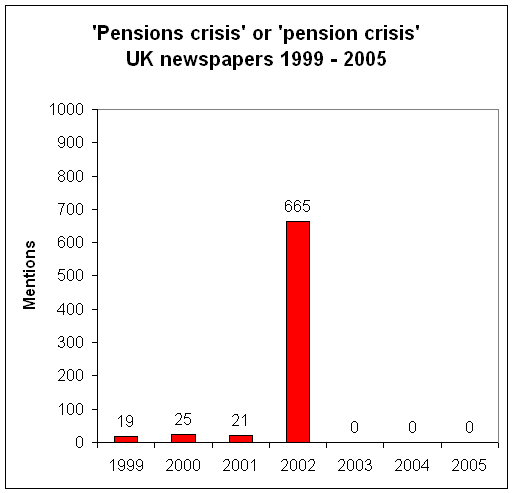
This talk was given on 23 November 2005
The text here may not be identical to the spoken text
PRE RETIREMENT ASSOCIATION - NOW THE LIFE ACADEMY
ANNUAL LECTURE
23 NOVEMBER 2005
Does the nation have the financial services industry it deserves?
I was tempted just to say ‘no, of course not’ and get on with the drinks. We don’t have the financial services industry we deserve. And perhaps more important we don’t have the financial services industry we need. And when I say ‘industry’ I don’t just mean the people who design overpriced products that don’t do the job they are supposed to. Or the sales staff who are motivated more by the commission they earn than the needs of the customer in front of them. I mean the politicians who set the laws and the framework they work in. And I mean the regulator who is supposed to keep them all in order.
Longer lives
It’s a strange time isn’t it? We are all waiting. Waiting for Godot. Also
known as Lord Turner of Ecchinswell. When Turner was elevated to the House of Lords in
September he was asked why he chose that name. He replied ‘It was a dare’.
Which if you think about it is accurate. If not very helpful.
Fifty years ago we were also waiting. Waiting for Godot. Samuel Beckett’s play opened at the Arts Theatre in London in 1955. And I hadn’t realised how relevant it was to the pensions crisis. It begins like this
ESTRAGON: Nothing to be done.
VLADIMIR: I'm beginning to come round to that opinion.
But after three years work it is unlikely that Lord Turner’s final report will be that short. The Financial Times claims to have had some leaks of what is going to be in the report when it is published a week today. It probably got an early version – the one addressed to Dear David Blunkett. But I am sure the FT is right to the extent that Turner will say working longer is one of the changes that have to happen. It is a theme that has run through his earlier report and his various speeches.
If there is one short phrase that sums up what lies beneath all the anxiety we have about pensions it is these four words. We are living longer.
And if anyone asks what lies behind the pensions crisis it is that simple phrase. Forget investment performance, forget Gordon Brown’s £5 billion a year tax raid, forget the £19 billion taken out of pension schemes through Lawson’s enforced contribution holidays, forget a high percentage of young people not joining their company scheme, forget the £170 billion occupational pension scheme deficit, forget the 85,000 people in wound up schemes that are not going to fulfil their pension promises. The pension crisis is about one thing. We are living longer. And if you want to add anything simply add ‘and longer’. And repeat. Fade to white. Because every time the actuaries look at our life expectancy it gets longer.
Wherever you look in the world, whatever pension system they have, they are all in difficulties. Not because of investments – some of them don’t have investments – not because of deficits – many don’t have deficits – not because of mean bosses or stupid politicians – some of them… well OK they all have those – but they are all heading for problems because in just about every country in the world people are living longer.
It is longer life that is changing the calculations of what we need to save. It is longer life that affects how much those savings will give us in retirement. It is longer life that is undermining the hopes we had of retiring earlier.
Now living longer is a good thing. The Government Actuary published his latest estimates a couple of weeks ago. And I was thrilled to see that I had been given an extra 98 days of life. I know this because I devised a spreadsheet which enables you to put in your date of birth and it tells you your date of death. When I put in my birth date the spreadsheet told me that my departure was scheduled for 19 September 2027. But when the new figures came out I entered the new data and my death has now been postponed to 26 December 2027. An extra 98 days. Apart from cancelling the funeral it really buggers up financial planning. Three months with no money left.
So if every year I am to get another nearly 100 days of life what did I expect when I took out my pension plan 20 years ago? If I had now the life I could have expected 20 years ago I would expect to die at 75 on 14 January 2024. That is almost four years less than I expect now.
|
Year |
Date of death |
Retires |
Length of retirement |
|
2005 |
26 Dec 2027 |
22 April 2013 |
5361 days 14y 8m |
|
1985 |
14 Jan 2024 |
22 April 2013 |
3919 days 10y 9m |
|
Change |
+1442 days +3yrs 11m |
none |
+1442 days |
So if I retire at 65 then in 1985 I would have expected 3919 days to live on my pension. But now in 2005 I expect to live 5361 days on my pension. An increase of 37%. So if the pension was adequate in the 1980s by the 20noughts it is pretty hopeless. And that is without taking account of the fact that annuity rates are not much more than half what they were then. And not taking account of the fact that if I live to 65 eight more years of GAD data – and the fact that I survive those next eight years – will mean I have even longer to live on a pension I hoped would be adequate in 1985.
But so far, if this is correct, I will have four years’ extra life. Why should I take all that as paid holiday? Suppose I split the difference, paying in an extra two years and enjoying an extra two years’ retirement. That’ll go some way to solving it. Especially when you think that I have had two more years to save.
|
Year |
Date of death |
Retires |
Length of retirement |
|
2005 |
26 Dec 2027 |
13 April 2015 |
4640 days 12y 8m |
|
1985 |
14 Jan 2024 |
22 April 2013 |
3919 days 10y 9m |
|
Change |
+1442 days +3yrs 11m |
-721days -2yrs |
+721 days |
And why shouldn’t I share the extra four years of life, two to work, two for holiday – it’s a good ratio. The solution to the pensions crisis is work longer. Saving more and paying more tax don’t work. There isn’t enough economy to go round. If we live longer we must work longer. After all, we know in our hearts we haven’t been that good to be awarded all that extra paid holiday at the end of our lives.
Now for me as a self-employed person if I take this paid holiday I have to pay for it. But that isn’t true for many people – those in public sector pensions will have the extra holiday paid for by taxpayers and those in good company schemes by the company if the pension fund does not have enough money in it to meet the promises it has made. Or they will get a proportion of it from the Pension Protection Fund.
And that is why I am sure that next Wednesday Turner will tell us that working longer has to be part of the solution to the pension crisis.
If there is one. And I mean if there is a pensions crisis, not if there is a solution.
The pension crisis
Where did the idea of a pension crisis come from? Let me take you back not
20 years but just six years to 1999. Then we had the non-existent millennium bug
to worry about but we certainly didn’t worry about pensions.
A friend of mine, a journalist, recalled that in the 1990s when he tried to interest his editor in a story about pensions the reply was ‘MEGO’ Pardon? ‘MEGO, son, My Eyes Glaze Over’. Story rejected. Not like that now is it?
I’ve been back and counted instances of the phrase ‘pensions crisis’ or the singular ‘pension crisis’ in the UK’s newspapers – the 24 national daily and weekend papers. It was a big pile to get through! In 1999 the term pension crisis appeared just 19 times in – that’s once very four weeks. And it was similar in 2000 and 2001. And many of those pieces were rather smug ones about a pensions crisis in other countries – Europe, America, even China – but not here.
But then in 2002 mentions of the pensions crisis shot up from 21 to 665.

So what happened in 2002? You may recall Philip Larkin’s poem Annus Mirabilis from High Windows 1974.
"Sexual intercourse began
In nineteen sixty-three
(which was rather late for me) -
Between the end of the Chatterley ban
And the Beatles’ first LP."
I can see several people born in the mid 1940s looking wistful there.
Rather less poetically, I can reveal today that the pensions crisis began on 8 February 2002. Here are the figures. In January 2002 just 2 mentions then in February it shot up to 50.
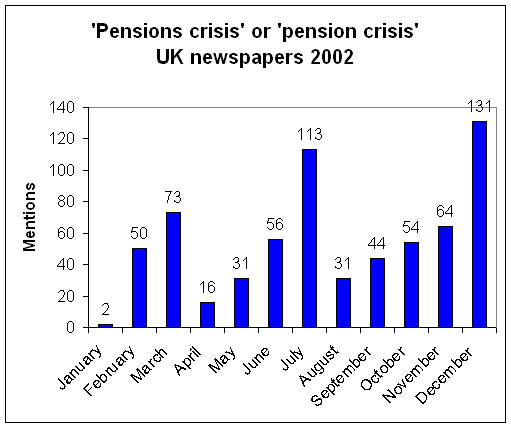
On 8 February Professor Richard Blundell gave a paper at an Institute for Fiscal Studies conference called ‘An end to the trend towards early retirement’. We would have to work longer. At the same time the IFS suggested raising the pension age to 67. And within a few days research showed that companies including Iceland were closing their final salary pension schemes. I might also add that just three months earlier Money Box broadcast Pensions in Peril, produced by Chris A'Court, which exposed for the first time the problems people faced if their company scheme was wound up.
The Daily Mail launched the pensions crisis on 8 February and the press went mad. In two months there were more mentions of a pensions crisis than in the previous six years. Then in July 2002 the Pickering Report A Simpler Way to Better Pensions about pension deregulation was published. And every pundit in Britain wanted to add their two penn’orth about what was wrong with pensions. Mentions of a pensions crisis in the press rose to 113 that month. And then in December 2002 the Government published its consultation paper Simplicity, security and choice: Working and saving for retirement – 131 mentions of a crisis in the press that month and by the end of 2002 the ‘pensions crisis’ – singular or plural – had become common journalistic currency.
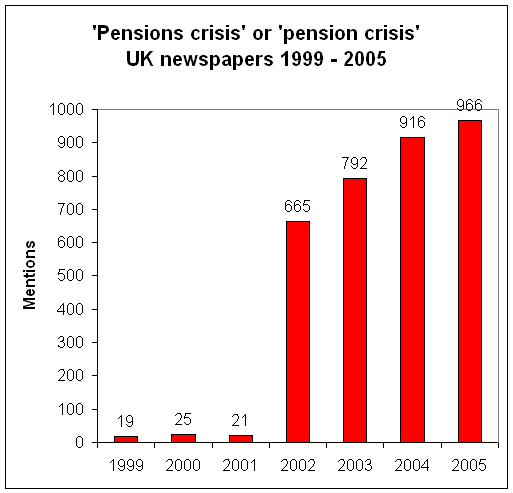
So in 2002 665 mentions. In 2003 the phrase appeared 792 times, last year 916 times and this year I project it to be close on 1000.
So if you want to know who to blame for the pensions crisis blame us, the media; we invented it in 2002.
Or perhaps we didn’t. Perhaps it was invented a long time before that. In the mid 1980s. By a heady mixture of politics and money.
The Thatcher revolution
"The past is a foreign country. They do things differently there." So begins
L P Hartley’s book The Go Between a story of illicit sex and the
destruction of trust. Now I won’t be talking to you about illicit sex – sorry –
but the destruction of trust – yes.
If we go back nearly twenty years to 1986 it was a foreign country. I remember it as I might recall a distant dream – or nightmare. Carol Thatcher’s Mum still had four years to go before she said ‘I’m the Prime Minister, get me out of here’, Nigella Lawson’s Dad was Chancellor and Norman Fowler – sorry I don’t know what his children do now but he did resign in 1987 to spend more time with them – was in charge of pensions as Secretary of State for Social Services.
In this strange country there were no personal pensions. There were good pensions in some large companies and in the civil service (some things are the same everywhere. You can trace those back to the distant land of 1855 when the debate was whether they should retire at 60 or 65. Quite a familiar country really 1855! They chose 60). In addition a few professionals invested in what were called retirement annuity contracts or section 226 pensions. Much of that money went into a pension fund with Britain’s oldest life assurance company favoured particularly by judges and the legal profession called Equitable Life. Whoops.
And there was no financial services industry. There were insurance agents, there was the man from the Pru, and there were stockbrokers and that was about it.
The Financial Services Act and the Finance Act of 1986 were the parents of the financial services industry and the pension system as we now know them. The twins of the great Thatcher revolution. Offspring of Carol’s Mum and Nigella’s Dad.
Before that, most people still relied on the state and that included the State Earnings Related Pension Scheme (SERPS) created by Barbara Castle to give everyone a state pension as good as the best in the private sector. But it was weakened by her own Cabinet colleagues before it began in 1978 and it was inherited a year later by the new Thatcher Government. They of course wanted the state to get out of pensions. And came up with the idea that we could all set ourselves free of our chains. Exactly what those chains represented wasn’t clear – to me anyway – but the Government paid for television adverts where a chained man did indeed set himself free and the first thing he did, as you would after a long time in chains, he took out a pension. Of his own. A personal pension.
The line was this. Instead of an uncertain (would you trust politicians? - the elected members of the Government asked!) and in any case unaffordable (they claimed) state scheme you could now buy your very own portable pension pot. And to make the bargain seem even better the Government, those same politicians, halved the value of SERPS and halved it again – making it much less attractive (though of course more affordable).
And to make sure your own personal pension pot wouldn’t start it’s life empty you could take some of the contributions you and your employer would have paid into the state scheme and pop them in. Together with tax relief – which wasn’t paid on state scheme contributions – and a nice bonus from the bulging National Insurance Fund. All courtesy of taxpayers in general. Around 8% of your pay.
The new financial services industry thought it had been born in the land of the All Year Christmas. Teams of poorly trained commission driven sales staff descended on a hapless population who, believing the television ads and newspaper copy which implied that for a few pounds a week anyone could buy political and financial independence, were willingly mis-sold £11.5 billion worth of personal pensions. Eventually the industry had to spend £2 billion finding the nearly two million people affected and repaying them the £11.5 billion they should never have put into their own pension in the first place. It was just the first in a series of at least five major financial scandals – the fertile soil on which the industry has continued to thrive.
Mis-selling scandals
No lawful industry has been rocked by such a succession of scandals as
financial services. Starting with pensions
Personal pensions mis-sold to nearly two million people from 1988 to 1994 cost the industry £11.5 billion in compensation and another £2 billion in running the compensation scheme.
Mortgage endowments sold from the 1980s right up to the late 1990s will leave three million people £16 billion short of the money they need to repay their mortgage. Only £1 billion of compensation has been paid.
Additional Voluntary Contributions – between 1988 and 1994 at least 100,000 customers were sold the wrong sort of AVCs to top up their company pension. More than £250 million in compensation has been paid.
Split capital investment trusts were sold as safe investments mainly from 1998 to 2002. Up to 50,000 individuals have lost at least £600 million. Compensation of £350 million was sought by the regulator. The industry finally coughed up £144 million – on condition it admitted nothing and got indemnity from further action.
Precipice bonds were sold between 1997 and 2004 to 450,000 mainly older customers who wanted safety and a good return. They put in £7.4 billion and may have lost more than £2 billion.
Those are the big five – the devastating hurricanes that swept through the savings of ordinary honest folk and left them in ruins. There were other minor ones too, tropical storms which did less damage but still cost millions more folk millions of pounds as with-profits investments failed to produce any profits at all, pensions were unlocked but the door only led to poverty, people were told they should contract out of SERPS only to find that it was their pension which had contracted. I could go on.
Apart from these major scandals in the last four years the Financial Services Authority has fined 72 companies and individuals more than £58 million and forced them to pay more than £336 million in compensation for a variety of activities ranging from the misleading to the illegal.
The mystery is not that the industry has lost the trust of its customers; the mystery is why anyone buys anything from it, at all, ever.
Behind all this mis-selling lie two things that come together in a fatal combination. One is commission. The other is language, misleading language. Product descriptions that are true but misleading – and designed to mislead.
Insurance in its present form was invented a couple of hundred years ago. but like many things it has been re-branded. You never hear about insurance now. The word is ‘protection’. Marvellous products that protect us from all sorts of horrible things. Except they don’t. Home contents protection? Does it prevent me getting burgled? No. Motor vehicle accident protection. Does it stop my car being run into? No. Building protection. Does it stop a lightning strike? No. It’s not protection. It’s insurance. Protection prevents things from happening. Insurance pays you if it does.
Take critical illness cover. There’s a good product. Seven dread diseases including cancer, heart attack, stroke, liver failure. I’d like protection against those. Instead I am offered £100,000 if I get one. To do what with?
It was heavily sold by salespeople on commission – they can get up to half the premiums for four years – £2000 for one sale. So no wonder that more than a million policies were sold in 2002 – five million altogether. But the insurers then realised that they had been oversold. In April 2003 Prudential overnight put up the price by 70% for 50,000 people who had already agreed to buy it at a lower price. And Pru changed the terms – disallowing future claim for several types of cancer. Other companies doubled premiums, made the conditions tougher – some now pay out only after your second heart bypass! Standard Life confirmed recently that it turned down one in five of the claims made and most of those were rejected because the person had not met the conditions.
One problem is that Standard Life sales literature says clearly that ‘cancer’ is covered. But the customer needs to get hold of another document which defines what ‘cancer’ means. Only if they read that will they discover that ‘cancer’ does not include many kinds of tumour and excludes most prostate and skin cancers. Similarly ‘heart attack’ excludes many ‘acute coronary syndromes such as angina’. ‘Loss of limbs’ means two or more. ‘Blindness’ has to be total and in both eyes. And so on. In the summer the Association of British Insurers suggested further changes to limit claims. Future proofing it calls them. Heart operations must involve cutting through the breastbone, loss of limbs must be permanent, and cancer – well unless you are going to die forget it.
The Financial Services Authority’s answer to this is not to ban products or product promotions but to set down the principle of
treating customers fairly
And that promotions should be
fair and not misleading
You might ask what kind of industry is it that has to be told to treat its customers fairly? Or advertise in a way that is fair and not misleading?
I would have a much simpler principle. Salespeople should ask ‘if I wasn’t paid commission for selling it, would I recommend this product?’ And if the answer is ‘no’ they shouldn’t sell it.
Commission
In May Money Box did a special programme on commission for Radio 4. We
called it Sins of Commission – you can hear the whole thing, which was
produced by Jennifer Clarke, on the
Money Box
website. One mortgage salesman in Cheshire told me he couldn’t make a living
selling mortgages if he didn’t sell insurance too. His average mortgage was less
than £100,000 and even one that big would only bring him £350. But if he added
on life insurance, critical illness cover and so on he could make £2,000. So was
a mortgage a loss leader to get this other business? ‘Yes’ he told me. And he
went on to describe unscrupulous advisers who sell payment protection insurance
rolled up in advance and added onto an expensive sub-prime loan, who can earn
themselves twice as much - £4000 in commission.
People came for a loan. But they left with insurance.
Treating customers fairly means minimising commission, not maximising it.
One question for the financial services industry is this. Why does it pay people so little for selling loans that the only way they can make a living is to sell insurance as well?
My view is that the reliance on commission is at the heart of the problems of the financial services industry.
I once visited a woman, in her 70s, who had been conned out of a lot of money by an IFA who visited her at home. I asked her about him. What was he like, did she have any suspicions about him? "No" she replied "he seemed such a nice man. He had a Rolls Royce and everything." That particular gentleman now lives abroad. The person I visited was lucky not to lose her home.
She was sold an old-style equity release product. Without commission, would they have been sold? Without commission, would pensions have been mis-sold? Without commission, would mortgage endowments have been sold at all. Without commission, would split capital investment trusts or precipice bonds have been sold? No.
I don’t generally blame the sales force. I blame the people who devised these products.
Take for example endowment mortgages. A certain debt due at a fixed time. And to pay it off we were sold a volatile investment that may or may not produce enough money to repay the debt. And if it does it may not produce it at the right time. Oh and by the way this will all happen when you are approaching retirement and have no way to earn extra money to repair the damage.
Explain it like that and no-one would have bought it. Around 12 million people would have bought straight repayment mortgages. And today more than two million people would not be around £16 billion short of the money they need to repay their mortgage. Compensation? About £1 billion paid so far. And £8 million in fines on nine firms involved.
These products like so many in that list of scandals – and the much longer list of unnecessary insurance – were created to generate sales, not to provide a service to customers. And certainly not to treat them fairly.
Persistency
Another piece of damning evidence against the industry are the persistency figures – how many people keep their long-term product long-term. Figures published by the FSA this June in 2004 Survey of Persistency of Life and Pensions Policies June 2005, show
Endowments – more than one in four sold by IFAs and more than one in three sold by company representatives given up after four years.
Whole of Life policies – one in five sold by IFAs and more than one in three sold by company reps given up after four years.
Personal pensions – almost half – 47% and 49% - sold by IFAs and company reps given up after four years.
Let’s look at that graphically for these three products combined. Remember these are all long-term products.

But after four years to the latest date available those sold by company representatives 37% more than one in three have been abandoned.
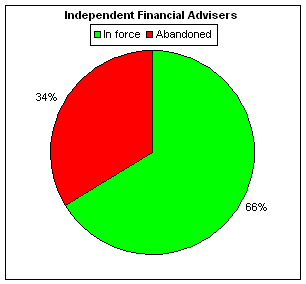
IFAs do little better 34% - still more than one in three - scrapped within four years.

Oddly the ones bought off the page are the best, by far. Just 20% one in five of these products bought direct are abandoned after four years. Not good but a lot better than sales that are ‘advised’.
And looking at the change over time, regular premium pensions only this time, it is getting worse.
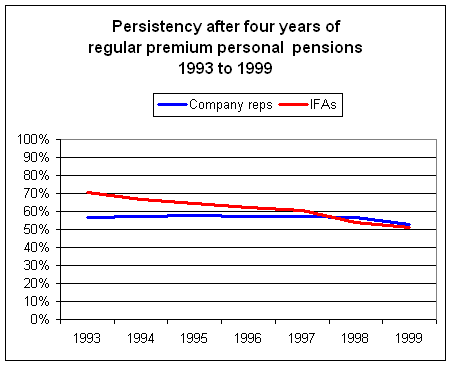
This is persistency after four years of regular premium personal pensions – down from almost 57% to 53% for company reps. And down from more than 70% to barely above half for IFAs.
Long term products, scrapped after four years. And where is the commission paid? Up front. In some cases almost all the premiums actually paid will have gone to pay the commission. These figures are a terrible indictment of the sales process for financial products.
I know the argument for commission – how do you motivate people without commission? Well it may come as a surprise but most people who work don’t get paid commission. What motivates doctors, journalists, politicians, police officers, cooks, bricklayers, teachers? I’ll tell you. If they do their job well, they are valued, promoted, and, yes, may be given a bonus at the end of the year. A fair wage for a worthwhile job. That’s what motivates most of us. And if people don’t do their job well, then they are offered advice, perhaps some training, and if that doesn’t work they are disciplined, warned. And ultimately sacked. That’s what controls most of us at work.
It’s called management.
And I know of at least one IFA which does work in precisely this way, paying staff no commission with a company annual bonus scheme.
I don’t believe the people who work in financial services are so different from all the rest of us that they can only be motivated to get out of bed by the thought of earning £2000 for selling a product that isn’t wanted, isn’t needed and may not even achieve the limited objectives it actually has. Will they only sell a £10,000 ISA if they get £400 up front and half a per cent of its value for ever? I don’t think so. Treat them like people, not like greedy bastards, and they might behave like the former, rather than the latter.
The Financial Services Authority
And where is the regulator, the Financial Services Authority, in all this?
Earlier this month, on 4 November the FSA published some research about payment
protection insurance (PPI). Now this product is sold to insure the repayments due on a
loan or credit card. If you are ill or lose your job it makes the payments for
you. Or it should. But it often doesn’t. Many people who are sold it discover
that they are excluded from claiming because of their age, their employment
status or their medical history. And those that do make a successful claim find
that payments are only covered for a year or that the amount covered is not
enough to pay off the debt.
Concerned about PPI, which it began to regulate from January 2005, The FSA did a mystery shopping exercise and found among other things that advice was poor, that commission could encourage mis-sales, training and competence was inadequate, health and employment status was not established. One man aged 68 was sold a policy that only paid out to people under 65. So far so good. All the problems exposed. Clive Briault, is the Managing Director at the FSA in charge of retail markets. He told me
"Approximately half of the firms we looked at failed to ensure that ustomers did not buy policies on which they could not claim."
So I asked "Will you warn customers about the companies that you thought were in danger of mis-selling these products?"
Clive Briault replied
BRIAULT: It is not our practice to name the firms involved in the sample or indeed to name the firms which we are looking at more closely.
LEWIS: But the problem is you know who these companies are. Customers could be being mis-sold these products today and the financial watchdog is choosing not to warn them of that.
BRIAULT: What we are trying to do is to work very hard with those firms to improve those standards. There is then the possibility that you know people will be mis-sold in the future as a result of that."
Let’s just look at that again. The Managing Director for Retail Markets at the FSA knows that this secrecy means "There is…the possibility that… people will be mis-sold in the future."
So the regulator knows the companies that are mis-selling these products with untrained, commission-driven staff. But the regulator, which has the statutory job of protecting consumers, won’t tell consumers who those firms are. Even though its Managing Director knows that could lead to mis-selling. And you can read or hear that exchange on Money Box on 5 November on the Money Box website.
The FSA says it is prevented by law from naming these companies until it has gone through the whole formal enforcement process set down in the Financial Services and Markets Act 2000. Whether that view is correct is currently being tested through a Freedom of Information request on another mystery shopping exercise which is now with the Information Commissioner. And of course for many of those involved it won’t go through that process. It will just have a quiet word. And their names will remain secret from consumers.
Depolarisation
Let’s go back to financial advisers. The people who sell us stuff. Or as the
FSA now calls them ‘retail intermediaries’. But that’s not what they call
themselves.
It’s just a year since a new world of financial advice began. Before that we had what was called ‘polarisation’. Everyone who sold us financial products, or investment products anyway, was either independent or tied. An Independent Financial Adviser had the legal obligation to look at the whole range of financial products and find the best one for our needs. A tied agent could only sell the products of one bank or insurance company, was tied to it.
So for journalists and the public it was quite easy. Two kinds of adviser. Independent or tied. Or as we often used to say good or bad.
But the FSA decided that polarisation was anti-competitive. And it suggested changes which were implemented in November 2004.
Before depolarisation there were two kinds of financial adviser. After depolarisation, today, there are how many? Any idea? Write down how many you think there are on your programme.
I don’t know if any of you have read Dickens’s A Tale of Two Cities recently. But when the character Sydney Carton had to deal with a particularly difficult case he soaked a towel in cold water and wrapped it round his head. If ever there was a need for that it is now.
Let’s start with investment advisers
They can sell you products from the whole market, from a limited number of companies, or from a single company or group
And they can act towards you in three different ways. They can
Advise and recommend, offer execution only – where you make the decisions and they just sell you what you choose, or they can be limited to selling you just ‘stakeholder’ products as recommended by the Sandler review.
And you can pay in three different ways - by fee, by commission or by both.
|
INVESTMENT |
||
|
Provider |
You |
Charges |
|
Whole market |
Assess, advise, recommend |
Fee |
|
Limited number of companies |
Give information but let you make your own choice |
Commission |
|
Single company or group |
Basic advice on stakeholder products only |
Fee and commission |
So that’s three ways to relate to providers, three ways to relate to you and three ways to charge you. 3 x 3 x 3 is 27. So there are 27 types of investment adviser.
Since October 2004 mortgage products have also been covered by regulation and mortgage advisers can sell to you from
The whole market, from a limited number of lenders, or from a single lender
And they can either advise and recommend or make a non-advised sale where you do the research and they just sell it you. There are no stakeholders here so that means there are just two ways to relate to you.
And they can charge you in two ways. No fee – which is commission or by a fee.
|
MORTGAGES |
||
|
Provider |
You |
Charges |
|
Whole market |
Assess, advise, recommend |
No fee |
|
Limited number of lenders |
Give information but let you make your own choice |
A fee |
|
Single lender or group |
||
So that’s three ways to relate to providers, two ways to relate to you and two ways to charge you. 3x2x2 is 12. So 12 types of mortgage adviser.
And since January this year insurance sales have also been regulated
They can sell to you from a range of insurers, a limited number of insurers, or just one insurer.
And they too can advise and recommend or do a non-advised sale. Again
no stakeholders here so that is just two ways to relate to you.
And they can charge you in two ways too – by fee or by no fee. Which is actually by commission but they don’t like to talk about that because insurance advisers don’t have to tell you what commission they earn.
|
INSURANCE |
||
|
Provider |
You |
Charges |
|
A range of insurers |
Assess, advise, recommend |
A fee |
|
Limited number of insurers |
Give information but let you make your own choice |
No fee |
|
Single insurer |
||
So that’s three ways for insurance advisers to relate to providers, two ways to relate to you and two ways to charge you. 3x2x2 is 12. So 12 types of insurance adviser.
Now any adviser can sell any of these products in any of these ways. They might for example be an independent fee charging mortgage adviser but add on payment protection insurance as a tied and non-advised sale.
So with 27 ways to offer investment advice, 12 ways to offer insurance advice and 12 to offer mortgage advice there are potentially
27 x 12 x 12 kinds of adviser. And 27 x 12 x 12 = 3888
Yes. 3888 different kinds of adviser.
And every one of them can call themselves a ‘financial adviser’ and some of them can call themselves independent financial advisers.
Now these people can sell you investments, sell you insurance, or sell you a mortgage. But in what sense are they financial advisers? Here is a list of the kind of financial advice people might need in their lives.
Debt
Borrowing for a car
Mortgages
Credit cards
Social security benefits
Insurance
Income Tax
Pensions
Current accounts
Savings accounts
Student finance
Tax credits
Investment
Budgeting
Inheritance tax
Out of those fifteen, how many can High Street IFAs give detailed advice on?
Debt. NO. Some IFAs will not even say pay off debt before you save or invest.
Borrowing for a car. NO.
Mortgages. YES. If they are a MORTGAGE ADVISER
Credit cards. NO.
Social security benefits. NO.
Insurance. YES if they are an INSURANCE ADVISER
Income Tax. NO, except in the limited sense that an ISA is tax free and there is tax relief with a venture capital trust.
Pensions. YES if they are an INVESTMENT ADVISER
Current accounts NO
Savings accounts. MAYBE if they are a really good INVESTMENT ADVISER.
Student finance. NO.
Tax credits. NO.
Investment. Yes if they are an INVESTMENT ADVISER.
Budgeting. NO.
Inheritance tax. NO – Though some investment advisers will recommend a product to alleviate it which probably won’t work.
So if these people can’t give advice on 10 out of 15 of the financial problems people have in what sense does calling them financial advisers fit in with what the FSA calls being ‘fair and not misleading’? They know about products that you sell, and can advise about them. But general financial advice? No. And why should they? If you go into Dixons the spotty youth will be able to sell you a music centre. He or she may even be able to compare features and prices with the others they have on offer. And of course sell you unregulated insurance products to go with them! But they are not hi-fi advisers. They can’t pick the best sub-woofer. Or tell you whether spikes on your speakers make a difference. Or compare Scart with Video-S. They are sales staff for the products of Dixons’ panel of providers.
And in that sense financial advisers are fairly and not misleadingly described as ‘investment – or mortgage or insurance – product sales staff’.
SIPPS
Finally let us return to pensions. Mis-selling, I am often told, is
something you can only identify with hindsight. It’s not true. Many people,
including me, were concerned about precipice bonds long before they were even
called that. Many people, including me, were concerned about driving people out
of SERPS into personal pensions when almost everyone said it was a good idea.
And now we can see a major mis-selling opportunity happening, as Tommy Cooper
used to say, before our very eyes. And I am not talking about venture capital
trusts, sold on the basis of tax relief – mmm that’s a good idea isn’t it? – and
I don’t mean lifetime mortgages. Even though the FSA itself has said both could
be a mis-selling scandals in the making. No.
I mean this.

Meet our new financial adviser. This as you can see is a City Gent. Or to give him his full name a London City Gent. In fact he is the London City Gent Bunnykins Teapot. And, wait for it, he was produced in a limited edition. Of only 2500.
Let me introduce you to some of his friends.
|
|
|
|
|
Father Bunnykins |
Gardener Bunnykins |
Juggler Bunnykins |
Aren’t they cute? Yes. But they are also your pension.
A press release landed in my in-box on 14 October this year with the headline:
"Bunnykins Recommended for New SIPPS Pension Schemes"
It goes on.
"Bunnykins, the family of figurines created by Royal Doulton, could be among the best investments for anyone looking to set up a new SIPPS pension scheme."
"This new scheme which comes into force on April 2, 2006" – yes it does say April 2 – "is intended to encourage investment in a wide range of appreciating assets such as residential property, fine wine, art antiques and classic cars. All these assets can be invested in a SIPP with up to 40% income tax relief (eg a £10,000 investment can cost as little as £6000)… Many Bunnykins figurines have appreciated massively in value during the past thirty years and could be a great asset for SIPPS investors."
It then introduces an expert from ITV’s This Morning who "explains how certain models have risen ten times in value from just a few pounds to several hundreds of pounds in the past decade."
I am not familiar with Bunnykins land but I presume this is how arithmetic works there.
Ten times a few = several hundreds
more formally
10 x few = several x 100
rearranging
10 / 100 x few = several
simplifying
1 / 10 x few = several
and turning back into language we get
A tenth of a few equals several
Would you put your pension into arithmetic that worked like that?
The press release contained no warnings that the price of Bunnykins can fall as well as rise. No mention of the 8% annual tax you will have to pay which will shrink their value if you keep these little charmers in a glass cabinet in your front room. It's like buying them again every twelve or thirteen years. Or of the storage costs if you don’t keep them at home. Nothing was said about the risk of damage to these pottery figures. There were no details of the high charges when you buy and sell them at auction – they have to rise in price by 50% before you start to make a profit if you buy and sell through a London saleroom, and it’s worse through dealers. And no suggestions about how you might get this pension asset to earn money for your pension fund. Perhaps you could rent these little fellas out. Insured of course. To make sure they don’t disappear.
And the press release can omit all those things because SIPPS are not regulated and won’t be for at least a year after the great bonfire of inanities that is A-Day when fifty years of pension rules are swept away on 6 April 2006.
And whether it is Bunnykins figures or Stradivarius instruments – invested in violins but it’s not a fiddle – or holiday flats in the Bulgarian resort of Borgas on the edge of the Black Hole, sorry I mean the Black Sea, SIPPS are an accident not so much waiting to happen but one that is beginning to happen now, in slow motion, like one of those movie scenes where the vehicle is tipping over towards the edge of the mountain road and all you can do is watch, wait for the explosion and pray it’s just the bad guys who get burned. But this isn’t Hollywood and it may not be.
Conclusion
So what should the financial services industry be like?
Scrap commission. It’s the cancer at the heart of the industry and until it goes there will be a conflict of interest between the adviser and the client. Put the customer at the heart of every sale. If this product did not carry commission would I sell it? If not, don’t.
Stop complexification. Making products so difficult to understand that no-one can be sure if they are buying the right thing or not. And if it goes wrong find it hard to prove that they didn’t. Get rid of those clever product descriptions that are designed to be accurate but misleading.
The regulator should act swiftly and in the interests of consumers.
And the Government? Among other things, it should act to make sure these little Bunnykins fellas don’t form part of anyone’s pension planning.
Thank you.
23 November 2005